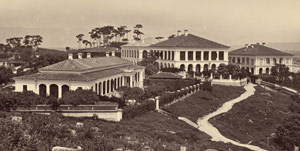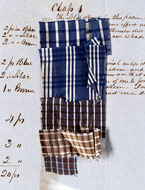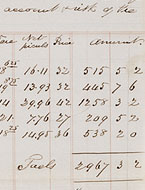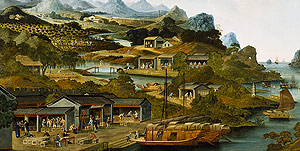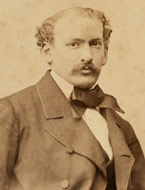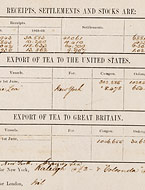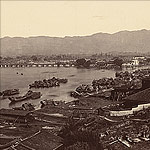
China’s commercial revolution gained further momentum in 1860 when the new, large-scale upcountry purchase of tea and silk became fully developed.
— Yen-P’ing Hao, The Commercial Revolution in Nineteenth-Century China: The Rise of Sino-Western Mercantile Capitalism35Exploring Trade Links in the Interior
After the Second Opium War (1856-1860), the opening of new ports and riverways sparked tremendous growth in trade. Westerners now ventured from the treaty ports into the interior of China where they could purchase tea and silk from peasants and merchants at lower prices. Augustine Heard & Co. opened a branch office at Foochow and worked with the comprador tea merchant Tong Loong-maw. The move came with potential hazards. No treaty protections existed in interior areas. Like other houses, Heard & Co. also made large advances to Chinese traders for the purchase of tea. “At first money went into the country to some extent in January, and more largely in February and March, and did not come back in the shape of tea till May,” Augustine Heard II wrote. “It was a great risk to run.”36
Circulars, sent out by Heard & Co. to their selling merchants, included information about the size of the tea crop, sales, and current prices, and were often accompanied by personal letters written by a house partner. Heard & Co. charged commissions for the amount bought and sold and for oversight of the purchasing, selling, insuring, and shipping. With the profits earned, the firm improved its operations and branched out into ancillary services such as insurance and banking and even an ice company and rice-cleaning mill.
In 1857 Augustine II returned home, leaving John and Albert Heard in China. The youngest and last brother to serve in the family business, George Heard arrived in 1859, first as secretary of the American delegation for the Treaty of Tientsin and then as the business manager for Heard & Co. “I had begun to think of going home, and of giving Albert my place at the head,” John Heard wrote. “I left the house firmly established, rich, and second to no other American house in China. Indeed, I doubt if many would not have called it the first.”37 John Heard sailed for America on December 1, 1862, the same year Augustine Heard retired from the business.

